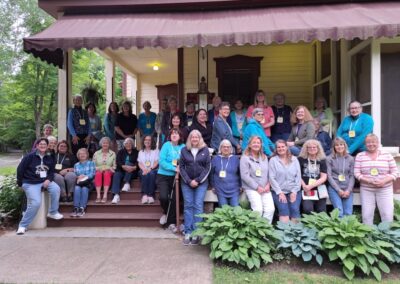As I sat in my beach chair late last month, toes in the sand and eyes fixed on an endless horizon that gave me the slightest inkling of eternity, I found for the first time in a very long time that I was truly experiencing vacation as it is meant to be: a time of complete rest, a chance to step away from our busy work lives and sink into stillness, or whatever our version of vacation might be.
Our world demands, or at least expects, that we work even on vacation. All too often we buy into that notion, convincing ourselves that if we work even when we should be playing, we will be secure, valued, loved. But we all know that the equation doesn’t add up. We work through our time off and return to our desks more depleted and frustrated than we were before we set up our out-of-office email message, and usually no more appreciated.
Not long after my vacation revelry, I came across an article about a new phenomenon called “quiet quitting,” which is actually a misnomer. As someone who was part of the “great resignation,” having quit my full-time job at the end of 2021, I thought “quiet quitting” might be another version of this nationwide trend among workers whose pandemic experience made them re-evaluate their priorities. But this is a new phenomenon. Quiet quitting is when workers — often of the Gen Z generation — refuse to work beyond the hours for which they are paid and refuse to do jobs that were not in their original job description. In other words, these younger workers already have their priorities straight, but the term “quiet quitting” makes it seem as though they are shirking responsibilities. That is the sickness of the American work landscape. If you don’t work beyond what you are paid to do, you are seen as a quitter.
All of this made me think of the field near my house that sits fallow this season. Sometimes there is corn, but often there is not. Why? Because if the farmers push the field to produce every season year after year, the soil will be depleted and eventually nothing will grow. We humans are not so different. If we push ourselves day after day, working before we get to the office and after we get home, working on weekends, working through vacations, eventually we will stop producing. Or we will produce but with a heart heavy with resentment and frustration.
We need Sabbath. It is a commandment, after all. And while we recognize the need to go to church and honor God, we often forget that the original idea of Sabbath was not an hour but a day. And it wasn’t just about setting time aside for God but for family, for rest.
Look at your week, your life. Where is your Sabbath? Do you attend Mass and then race to the grocery store, or do you savor the day and let the spiritual nourishment of prayer bleed into everything else you do, transforming the day into a time of true respite? God is found not only in the pews at our parish on Sunday. God is found in the flowers (or even the weeds) in our backyard, in the clouds floating overhead, in the cup of coffee sipped slowly on the front porch, in the neighbor we stop to chat with as we walk the dog. As St. Ignatius taught, we are called to “find God in all things,” but if we never put down our phones, our laptops, our work emails and work files, we will miss God in our midst and the joy that accompanies that gift.
Being quiet is never about “quitting.” It just might be the most productive thing you can do. Guard your time. Replenish your soul. Disconnect and take a Sabbath day, not a Sabbath hour. Watch how that fallow time changes your perspective and your life.
This column originally appeared in the Sept. 2, 2022, issue of The Evangelist.








